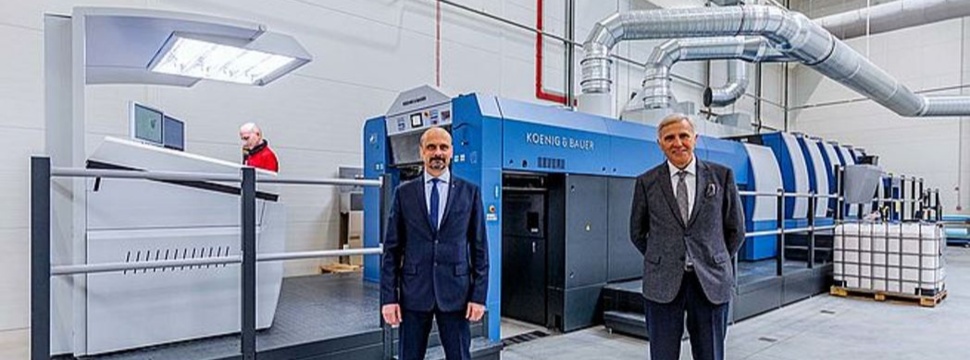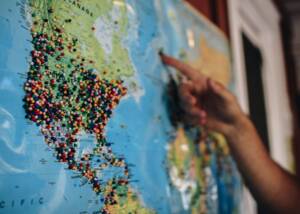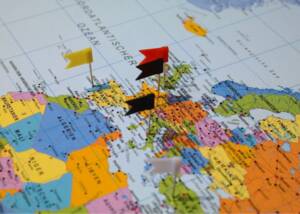Koenig & Bauer delivers Rapida 106 to a Polish eco-print company
News General news
- Inauguration of an eco-factory
- Five-colour Rapida 106 with extensive coating facilities installed
- Special antimicrobial coating effective against many pathogens

For playing card producer Fabryka Kart Trefl-Kraków, 2020 was one of the most important and most groundbreaking years in the company's history – one which extends back more than seven decades. As part of an investment in a production facility for innovative cards and board games, the company opted for a new five-colour Rapida 106 with coater and three-section extended delivery made by Koenig & Bauer. This press is the ideal choice for a factory with an ecological focus, and that produces environmentally friendly cards and games, which can – should the customer choose – also be protected with a special coating featuring antimicrobial properties. The entire factory is based on solutions that are compliant with the principles of a circular economy and sustainable development. In this environment, the Rapida 106 is a perfect fit.
Long traditions
Fabryka Kart Trefl-Kraków is the oldest and largest producer of playing cards in Poland. Spurned by a changing market, subsequent investments in new equipment have meantime enabled the company to diversify into the field of board games. This process benefited from additional impetus in 2015 with the move from the centre of Kraków to new premises in Podłęż, near Niepołomice.
“That was a logical step in our development, because cards are an integral element of many board games,” says Stanisław Wiązowski, director of Fabryka Kart Trefl-Kraków. “We started to incorporate board games into our own product portfolio, but also produce them for publishers all over the world as part of our B2B activities. We are currently working with customers from more than 30 countries, mainly in Western Europe. Last year, we set up the publishing house Muduko, adding it to the brand Zu&Berry, which had already been established two years previously and whose products can be found in toy shops all over Poland.”
As a sign of commitment to the global trend towards ecological production, the company opened a new eco-factory with state-of-the-art, environmentally friendly production equipment in September last year. The idea to protect cards and games with antimicrobial substances had already been on the table for some time. This project, including the necessary equipment, received funding from the EU within the framework of its environmental measures.
Environmentally friendly games
“It seems that we have triggered a new trend with our environmentally friendly board games, which have been enthusiastically welcomed by our customers,” says Stanisław Wiązowski. Eco-friendly games are one element of a broader ecological strategy at Fabryka Kart Trefl-Kraków. Only environmentally friendly, i.e. biodegradable or recyclable board and paper substrates, are used. This principle applies to all parts of a game – not only the boards and cards, but also to any figurines or dice, which are made from cardboard or wood instead of plastic.
Stanisław Wiązowski explains: “The customers can decide whether they would like to have an environmentally friendly game produced in our factory. We issue a certificate to verify that these production methods were used, and the customer is then entitled to endorse the product with the corresponding ecolabel.”
Katarzyna Czerewko, head of marketing at Fabryka Kart Trefl-Kraków, adds: “Ecology is the most important concept around which we are organising the company. The opening of our eco-factory and the new portfolio of environmentally friendly games were spawned by this idea.”
Games with antimicrobial properties
“Production of innovative card and board games protected by a coating with antimicrobial properties” is another project being pursued by Fabryka Kart Trefl-Kraków. Stanisław Wiązowski: “Together with scientists from Warsaw University of Technology, we already began work on a microbiologically safe technology in 2017. In the meantime, numerous studies and tests have been performed that confirm that it is both effective and safe for users and the environment. Independent research institutes have confirmed that the coating offers long-term protection against many types of pathogens. Our patented antimicrobial technology is based on what is known as nano-silver, and a surrounding layer of silicon dioxide, which makes it non-toxic and harmless to health and the environment. The coating is applied exclusively using the new Rapida press.”
Katarzyna Czerewko adds: “Just as is the case for environmentally friendly games, customers are able to choose whether their products should be made using this antimicrobial technology. It is, of course, also possible to select both elements. This allows us to offer a range of options from which the customers can choose the optimal solution for their individual requirements.”
More press technology from Koenig & Bauer
The tender for the new offset press specified a number of equipment features that are essential to ensure the entire project can be implemented effectively. The press chosen is, once again, a medium-format Rapida from Koenig & Bauer.
Stanisław Wiązowski points out how energy efficient the Rapida 106 is, among all its other benefits: the waste heat produced by the press is used for heating the production hall, and the press is also equipped with special VariDryBlue drying systems. A large number of measurement and control systems promote enhanced production efficiency, fast correction of any errors that arise, and reduced waste. These systems include ErgoTronic ColorControl and Lab, QualiTronic ColorControl and PDFCheck. As the company director points out: “That is all part of our pro-ecology strategy.”
“We wanted the hardware solutions that are installed in our eco-factory to be as environmentally friendly as possible. For the printing press, it was important to meter the antimicrobial agent precisely after mixing it with the coating in the coating tower. It is a well-known fact that the inline process is much more efficient, and rules out potential defects and errors. We have already gained very positive experience with the Rapida 105 that we installed three years ago, and are delighted that this Koenig & Bauer solution also meets all the tender criteria for our current EU project.”
To cater to the intended production spectrum, the Rapida 106 has been raised by 450 mm and has been configured with a special equipment package to allow it to print on substrates with a thickness of up to 1.2 mm. Production efficiency has also been increased by means of automatic non-stop pile changing solutions, simultaneous plate changing with DriveTronic SPC, and automatic anilox roller exchanges with AniloxLoader. The press prints at speeds up to 20,000 sheets per hour.










